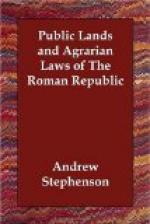Party lines were, at the time of the enactment of the Licinian Law, strongly marked in Rome. One of the tribunes chosen after the return of the plebeians from Mons Sacer was a Licinius. The first military tribune with consular power elected from the plebeians was another Licinius Calvus. The third great man of this distinguished family was Caius Licinius Calvus Stolo, who, in the prime of life and popularity, was chosen among the tribunes of the plebs for the seventh year following the death of Manlius the Patrician. Another plebeian, Lucius Sextius by name, was chosen tribune at the same time. If not already, he soon became the tried friend of Licinius. Sextius was the younger but not the less earnest of the two. Both belonged to that portion of the plebeians supposed to have been latterly connected with the liberal patricians. The more influential and by far the more reputable members of the lower estate were numbered in this party. Opposed to it were two other parties of plebeians. One consisted of the few who, rising to wealth or rank, cast off the bonds uniting them to the lower estate. They preferred to be upstarts among patricians rather than leaders among plebeians. As a matter of course, they became the parasites of the illiberal patricians. To the same body was attached another plebeian party. This was formed of the inferior classes belonging to the lower estate. These inferior plebeians were generally disregarded by the higher classes of their own estate as well as by the patricians of both the liberal and illiberal parties. They were the later comers, or the poor and degraded among all. As such they had no other resource but to depend on the largesses or the commissions of the most lordly of the patricians. This division of the plebeians is a point to be distinctly marked. While there were but two parties, that is the liberal and the illiberal among the patricians, there were no less than three among the plebeians. Only one of the three could be called a plebeian party. That was the party containing the nerve and sinew of the order, which united only with the liberal patricians, and with them only on comparatively independent terms. The other two parties were nothing but servile retainers of the illiberal patricians.
It was to the real plebeian party that Licinius belonged, as also did his colleague Sextius,[1] by birth. A tradition of no value represented the patrician and the plebeian as being combined to support the same cause in consequence of a whim of the wife and daughter through whom they were connected. Some revolutions, it is true, are the effect of an instant’s passion or an hour’s weakness. Nor can they then make use of subsequent achievements to conceal the caprices or the excitements in which they originated. But a change, attempted by Licinius with the help of his father-in-law, his colleague, and a few friends reached back one hundred years and more (B.C. 486) to the law of the martyred Cassius, and forward to the end of the Commonwealth. It opened new honors as well as fresh resources to the plebeians.




